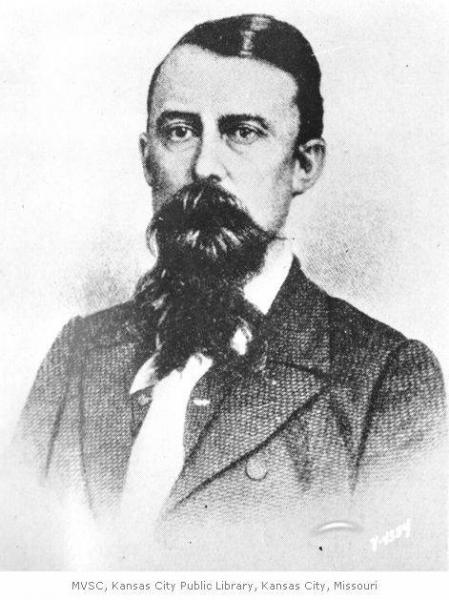By Christopher Phillips, University of Cincinnati
Biographical information:
- Date of birth: December 12, 1830
- Place of birth: Lexington, Kentucky
- Claim to fame: Captain in the Missouri State Guard; Major General in the Confederate Army; led "Shelby's Great Raid" on Missouri; fought in Battle of Wilson's Creek and Price's Raid
- Nickname: "Jo" Shelby
- Political affiliations: Democratic Party
- Date of death: February 13, 1897
- Place of death: Adrian, Missouri
- Final resting place: Forest Hill Cemetery, Kansas City, Missouri
Joseph Orville Shelby, Confederate cavalry commander, was born in Lexington, Kentucky on December 12, 1830. Educated at Transylvania University in Kentucky, he moved to Waverly, Missouri, in 1852, becoming a rope manufacturer and hemp planter and one of the state’s largest slave owners. During the Missouri-Kansas border troubles, he led two armed forays of proslavery activists into Kansas, one of which participated in the Sack of Lawrence.
Shelby led horsemen in every major battle west of the Mississippi over the next two years, including Carthage, Wilson's Creek, and Lexington in Missouri, and Pea Ridge in Arkansas.
At the outbreak of the Civil War, Shelby organized a company of cavalry and offered his services to the deposed governor, Claiborne Fox Jackson, commanding the pro-Southern State Guard forces. Named captain of cavalry, Shelby led horsemen in every major battle west of the Mississippi over the next two years, including Carthage, Wilson's Creek, and Lexington in Missouri, and Pea Ridge in Arkansas, as well as in scores of minor actions. By war's end, his exploits as a cavalry commander west of the Mississippi earned him a reputation there that was comparable to that of Nathan Bedford Forrest (a Confederate lieutenant general of cavalry, who is today perhaps most famous for being the first Grand Wizard of the Ku Klux Klan) east of the river.
Commissioned a colonel in the Confederate service in June 1862, he organized a brigade of cavalry that he called the "Iron Brigade," which proved one of the finest cavalry units in the trans-Mississippi theater. He then participated in actions in Arkansas at St. Charles and DeVall's Bluff, and he served with John S. Marmaduke's cavalry division at Prairie Grove. Shelby was wounded in action at Helena in July 1863, and upon his recovery he conducted a “Great Raid” on Missouri, capturing hundreds of federal soldiers and horses and mules, as well as weapon and ammunition caches, and destroying blockhouses in Boonville, Warsaw, Tipton, Stockton, and Neosho before retiring to Arkansas. (Whether by design or coincidence, the Raid’s commencement coincided with the one-year anniversary of the Emancipation Proclamation.) For his service, Shelby received promotion to brigadier general.
View Shelby's Raid in a larger map
At Princeton, Arkansas in March 1864, Shelby's force of 1,000 horsemen delayed at least 12,000 federal infantry under Frederick Steele for an entire day, contributing to Steele’s failure to take Little Rock during his Arkansas Campaign. After successful raids along the White River that summer, Shelby participated in General Sterling Price's raid into Missouri, engaging at Pilot Knob, Big Blue River, and Westport, among other battles, after which he retreated to Clarksville, Texas.
Unwilling to surrender at the war’s end, Shelby, by then a major general, and his loyal command of about 1,000 men crossed the Rio Grande into Mexico. There they assisted Sterling Price in founding Carlota, a colony of ex-Confederates. In 1867, Shelby returned to Missouri, rebuilding his former home near Waverly, which had been burned during the war by federal troops. In 1885, he took up farming near Adrian, in Bates County, the heart of the Burnt District, where he lived out the remainder of his life.
A Democrat, Shelby received a patronage appointment from Grover Cleveland as U.S. marshal for Missouri’s Western District, which he held until his death on February 13, 1897. Shelby is buried at Forest Hill Cemetery in Kansas City, by then the center of Confederate commemoration in Missouri. As a mark of respect, many of his officers and other former Confederates elected to be buried there near him.
Suggested Reading:
Edwards, John N. Shelby and His Men; or, The War in the West. Cincinnati: Miami Printing and Publishing Co., 1867.
O'Flaherty, Daniel. General Jo Shelby: Undefeated Rebel. Chapel Hill: University of North Carolina Press, 1954.
Cite This Page:
Phillips, Christopher. "Shelby, Joseph Orville" Civil War on the Western Border: The Missouri-Kansas Conflict, 1854-1865. The Kansas City Public Library. Accessed Friday, April 26, 2024 - 19:28 at https://civilwaronthewesternborder.org/encyclopedia/shelby-joseph-orville


